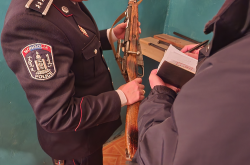
When a shot is fired, the firearm leaves microscopic markings on the casing and on the projectile. This data can be converted into an image, which can be cross-compared against other ballistic evidences through our Ballistic Information Network (IBIN).
With over 1,800,000 records, IBIN provides a global platform for the centralized collection, storage and cross-comparison of ballistics data.
Matching up crimes across the globe
Ballistics data shared via IBIN has revealed links between gun-related crimes taking place thousands of miles away, providing valuable investigative leads for police.
Member countries are encouraged to follow the IBIN Search Protocol and to conduct international ballistic comparisons for all ballistic recoveries:
- Within 80 kilometres of international borders;
- By customs or border officials;
- From suspected traffickers of any type of contraband (drugs, documents, guns, etc.);
- Related to terrorist activities;
- From persons with a residence in another country.
Technology and access
We provide our member countries the secure network (IBIN) allowing them to share and compare ballistic data internationally.
How IBIN works
Using IBIS® technology captures, IBIN captures digital images of the unique microscopic markings that are found on fired bullets and cartridge cases. Law enforcement officers can then extract an electronic signature from each image, which is compared against the database of previously entered images.
The system provides potential matches (hits) that may link two or more crimes or a suspect’s gun to prior crime(s). As a result, forensic experts can provide police with more timely information to help solve and prevent crimes.
Access for non-IBIN members
Law enforcement agencies from non-IBIN member countries can benefit from IBIN’s international ballistics database by contacting the INTERPOL General Secretariat through their respective INTERPOL National Central Bureau.
Related documents








